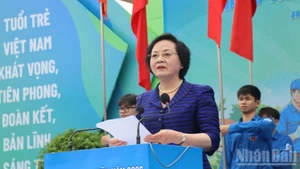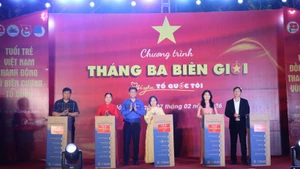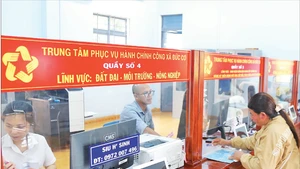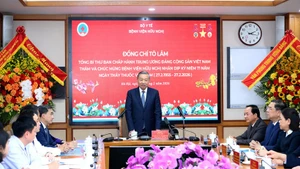Today, social networks are not only platforms for communication and sharing but have become vast “streams” of information, where a single message can reach millions within seconds. Official information and fake news are intermingled, creating a risky landscape. If not promptly stopped, fake news can cause public confusion, erode trust, and even threaten social security.
In this context, influencers, including KOLs (Key Opinion Leaders) and KOCs (Key Opinion Consumers), are no longer just messengers. With their credibility and broad reach, they play a crucial role in filtering the information flow, retaining positive values and halting misinformation and harmful content before it spreads to the wider community.
First, through creative and flexible language, KOLs can translate Party and State policies, as well as legal regulations, into messages that are relatable, easy to remember and easy to follow for the general public. During the recent National Day celebrations on September 2, many KOLs helped spread patriotic spirit and national pride, working with state agencies to disseminate official content. Statistics show that more than 600 clips on the National Day theme were posted, attracting over 150 million views.
KOLs also help steer public opinion at critical moments, when society faces the risk of confusion from the spread of fake news. During the COVID-19 pandemic, for instance, doctors who were also influencers actively refuted misleading claims about so-called “miracle cures”. By providing clear scientific evidence, they reinforced public trust in the medical measures implemented. This highlights the role of KOLs as a bridge for quickly delivering official information to citizens, while contributing to public order and social stability during sensitive periods.
Beyond guiding opinion, KOLs also encourage collective action and nurture civic responsibility in cyberspace. Simple appeals from KOLs such as “Verify before sharing” can help foster positive habits: pausing to fact-check information before passing it on. This is a concrete example of how KOLs contribute to building a digital culture that is civilised and healthy.

When many KOLs raise their voices together and embrace social responsibility, the combined effect creates enormous power. A clear example was the first National KOL Conference, where the “Digital Trust Alliance” was launched. This initiative brings together KOLs, regulators, platforms, businesses and the press to jointly fight fake news, online scams and misleading advertising, while spreading positive and humane values. The alliance is expected to become a hub for connection and experience-sharing, as well as a mechanism for self-monitoring to enhance transparency and social responsibility among influencers.
These examples demonstrate that when influencers act with political awareness and a strong sense of social responsibility, they can become a core force in strengthening ideological resilience, protecting public trust and ensuring social stability against the negative impact of fake news.
Barriers to overcome
Despite their vital role in the fight against fake news, influencers still face significant obstacles.
First, the risk of misinformation is ever-present. Many KOLs lack deep expertise in sensitive fields such as healthcare, science and law. Over-simplification or insufficient verification during communication can inadvertently turn them into channels of misinformation. Even minor slip-ups in their statements can trigger a chain reaction, negatively influencing public perception.
Commercial pressures also pose a major barrier. When community messages are overshadowed by commercial interests, their objectivity and persuasiveness decline, leading the public to question the influencers’ true motives.
Moreover, when engaging with sensitive issues, KOLs often become targets of controversy or even personal attacks. Such pressures affect their reputation and credibility, while also creating hesitation, discouraging many from joining anti-fake-news campaigns. As a result, their influence is limited and social impact falls short of expectations.
Most notably, the absence of a robust legal framework and a coordinated mechanism linking KOLs, the press, social platforms and state authorities means that efforts against fake news have yet to achieve their full potential. Fragmented collaboration reduces the positive impact KOLs can deliver.
Strengthening Mechanisms to Harness the Power of KOLs
Addressing these challenges will reinforce the crucial role and effectiveness of KOLs in combating fake news.
First and foremost, enhancing professional knowledge and communication skills is essential. Specialised training programmes on law, cyber security and fact-checking will enable KOLs to ensure accuracy while maintaining creativity in their messaging.

At the same time, wider collaboration is needed to form a network of responsible communication. The KOL Summit 2025, which brought together nearly 300 outstanding KOLs nationwide along with representatives from regulators, businesses, technology platforms and media outlets, marked a milestone and a starting point. Within such a common framework, KOLs can access official information quickly and accurately, while also receiving guidance on content orientation and engaging in multi-channel cooperation to enhance their impact.
Additionally, a multi-layered fact-checking mechanism must be developed. KOLs should prioritise official sources, collaborate with domestic independent fact-checking organisations, and harness artificial intelligence (AI) to detect, label and flag fake news. This not only safeguards the reputation of KOLs but also helps shape a public habit of consuming verified information.
Finally, a code of ethics for KOLs should be introduced and enforced without delay. This code must emphasise transparency and social responsibility, prohibit the commercialisation of community messages, and discourage exploiting sensitive issues for self-promotion. In parallel, mechanisms are needed to honour exemplary KOLs who spread positive influence, while strictly handling violations. Such measures will bind responsibility while motivating influencers to contribute more actively.
















